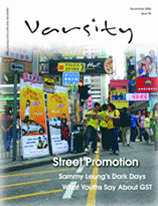


Periscope
Street promoters face company scrutiny, arrest
by Lucinda Ho
It was two o’clock in the morning. Carol Cheung Lok-kwan, a broadband service direct sales representative, had already worked for 12 hours and was still standing in an empty street in Mong Kok with a hope to find a customer. She recalled she had to meet the sales quota of that day for her summer job, or she would be blamed by her supervisor.
After doing the job for a month, Miss Cheung decided to quit. “It was too harsh. My regular working hours were from 2:00 p.m. to midnight . And we needed to keep on working even when it rained heavily,” the 17-year-old student said.
Street promoters work under intense pressure of the quota system while facing their companies’ close watch of their performance and the risks of being arrested and prosecuted for causing obstruction or nuisance by government authorities.
To hold on to the jobs, street salespeople say, they usually submit to the demand of their bosses to work overtime although their contracts do not have an obligatory clause on daily sales quota.
The salary of a street promoter, in fact, is determined by the quota, or target of sales. Their sales can provide them with a commission of $200 to $900 for each successful deal, on top of a basic monthly salary of about $4,000.
After getting a good sales result, they can choose the pitches themselves in the following month. The better result they achieve, the higher priority they can choose a busier location to do their promotion. In an ideal spot, they can get more potential customers and have a bigger chance of making outstanding sales figures. For others, they can only work at a location assigned by their companies.
To ensure street promoters are doing their jobs, companies have their own
monitoring systems. For example, Miss Cheung, a former promoter for i-Cable Communications Limited, said the company sent some district managers disguised as passers-by to oversee the direct sales teams. From time to time, direct sales representatives would be blamed if they were found sitting on a chair or chatting with each other, neglecting their duties.
According to Ah Keung, who works for Hong Kong Broadband Network Limited, the company uses global positioning system technology installed in its staff’s mobile phone SIM cards to monitor their movements. Once the staff turn on their mobile phones, the company can find out their exact locations, said Ah Keung, who declined to give his full name.
OTHER STORIES IN PERISCOPE
Control of street promotion urged to cut nuisance
Same street, different campaigns

A street promoter tries to look for a customer at Sai Yeung Choi Street South in Mong Kok.
